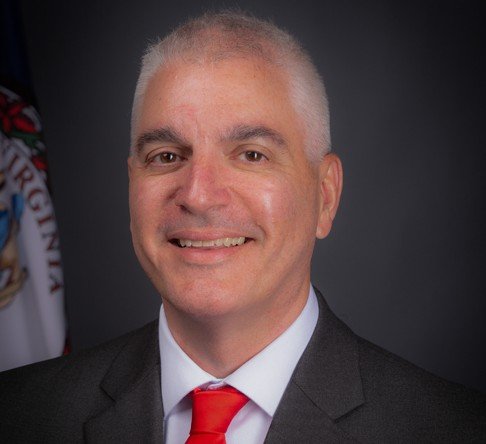Virginia Wants to Be the National Leader in Correctional Education
Pictured from left to right: Dr. Felicia Ganther, Senior Vice Chancellor for Academic and Workforce Services at the Virginia Community College System & Chadwick Dotson, Director, Virginia Department of Corrections
Virginia is ready to grow its prison education programs, according to two state leaders from the higher education and corrections spaces.
Dr. Felicia Ganther, Senior Vice Chancellor for Academic and Workforce Services at the Virginia Community College System (VCCS), and Chad Dotson, Director of the Virginia Department of Corrections (VDOC), took the stage during the “Building Consensus” conference hosted by the Virginia Consensus on July 17, to talk about progress and opportunities when it comes to higher education programs in state prisons.
By the Numbers: Prison Education Programs in Virginia
“We are doing a lot, but the issue for us is that we can do more,” said Ganther.
Dr. Felicia Ganther, Senior Vice Chancellor for Academic and Workforce Services at the Virginia Community College System
As of 2020, VCCS colleges served 233 incarcerated students. Today, 460 students at Virginia prisons are enrolled in associates degree-granting programs.
Eleven VCCS colleges offer some form of academic or workforce program in Virginia prisons. Three of the colleges are recognized by the US Department of Education as Prison Education Programs, which allows them to enroll income-qualified students using federal Pell grants. These students earn transferable degrees that make advancement to bachelor's programs possible.
VCCS aims to increase college enrollment of students who are incarcerated by 25% by 2030. To get there, Ganther noted VCCS is focusing on broadening partnerships.
Dotson: Committed to Growing Programs
“This is a long-term effort that we are fully committed to,” said Dotson.
Reporting on progress in the last calendar year, Dotson noted that VDOC has signed at least six new or renewed memoranda of understanding (statements of partnership) with colleges. Importantly, they have also launched JSTOR access for students in the prison libraries.
“Ultimately, Virginia wants to be the national leader in correctional education,” Dotson remarked.
Chadwick Dotson, Director, Virginia Department of Corrections
JSTOR is a digital library that is capable of providing over 12 million works across 75 academic disciplines, including journal articles, books, images and primary sources to support college-level research by incarcerated students once content is approved by Virginia corrections staff.
In addition to his leadership in the Commonwealth, Dir. Dotson traveled to Washington, D.C. to educate Virginia’s Congressional delegation about proposed legislative changes affecting Pell Grant eligibility for incarcerated students. He raised concerns about policy shifts then under consideration, such as eliminating eligibility for students enrolled less than half time and redefining full-time enrollment from 12 to 15 credit hours, which could have created significant barriers to access in a prison setting. Ultimately, neither of these concerns materialized in finalized legislation.
Data Highlights Success
“I always tell people we're in the reentry business,” said Dotson. “That’s actually our business and education is a key factor.”
Dotson shared that as of June 30, the majority (67%) of people serving time at Virginia Department of Corrections facilities had a verified GED or high school diploma. This would make them academically eligible for post-secondary education.
Access to Pell grants to pay for college depends on meeting income requirements and having access to an approved Prison Education Program at the facility of residence. Pell grants can be used to support individuals pursuing up to a bachelor’s degree.
Dotson is proud of Virginia’s recidivism rate of 17.6%, the lowest in the nation. He noted that if students complete a career technical education course, the recidivism number drops to 9.5%, bringing tremendous cost savings to communities.
Consistently, research indicates incremental decreases in recidivism and increases in post-release salaries with each step of academic degree attainment, with college degrees delivering the largest impacts on wages and public safety.
VDOC expects increased interest in prison education programs because of growing awareness of Pell grant availability. Originally launched as a pilot in 2015, “Second Chance Pell” became permanent in 2023 as part of broader efforts to reduce recidivism, increase job readiness and improve reentry outcomes.
Currently, Pell Grants can be used for academic degree programs up to the bachelor’s level. Recent federal legislation expanded Pell to eventually also include shorter, workforce-oriented programs, but rules and procedures are still pending on that new development.
The goal is clear, and Virginia is working hard to reach it. With strategic partnerships, increased access to resources like JSTOR and expanded use of Pell funding, Virginia is looking to position itself as a leader in correctional education. The work ahead is both urgent and full of promise, and it holds the potential to transform lives and build a more just Commonwealth for all.
If you’d like to be part of the continued effort to expand access to postsecondary education in Virginia’s prison system, we invite you to take a simple step toward tremendous impact and join the Virginia Consensus for Higher Education in Prison.



